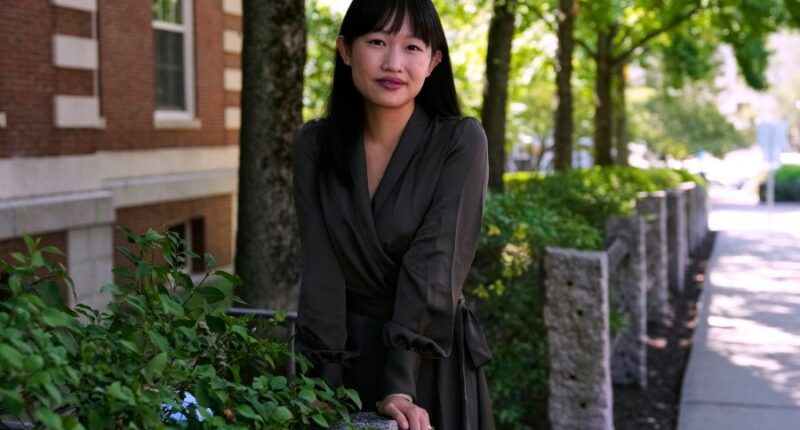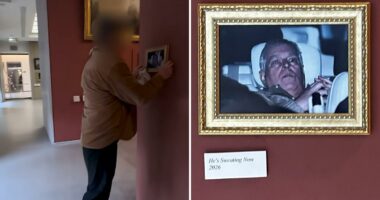Share this @internewscast.com

For Rebecca F. Kuang, who has achieved the remarkable feat of having six bestsellers before turning 30, the concept of an everlasting life spent in leisure terrifies her more than the prospect of hell.
“As a child, I was taught that when you die, you ascend to heaven, where you spend your days indulging in cake and socializing with friends,” explained the 29-year-old Chinese American author, raised with Christian beliefs, known to her readers as R.F. Kuang. “This notion deeply unsettled me because the endless routine of such an existence seemed quite daunting. It felt like there wouldn’t be any stakes or anything valuable, as time would lose its meaning.”
This contemplation on life after death inspired Kuang’s latest book, “Katabasis.” Following the sharp satire of the publishing world and social media in her 2023 hit “Yellowface,” Kuang ventures back into the realm of fantasy.
Much like her 2022 release “Babel,” “Katabasis,” launching this Tuesday, presents a dark yet witty exploration of academic life—a subject familiar to Kuang, who is currently a graduate student at Yale University. The book has captured the attention of BookTok and various prestigious publications as a highly anticipated release. Plans are underway to adapt it into an Amazon series, with Angela Kang, the showrunner of “The Walking Dead,” at the helm, and Kuang stepping in as a producer.
Kuang, though, tries not to let pressure and high expectations get to her.
“I think there’s always a bit of anxiety before a book launch, but dwelling on it isn’t productive,” shared Kuang, who had already penned multiple chapters of “Katabasis” by the time “Yellowface” debuted.
The book follows the journey of Alice, a doctoral student in magick analytics at Cambridge, who is fixated on securing the ultimate academic accolade: a recommendation letter from the head of her department. When he passes away unexpectedly, Alice uses a pentagram to navigate purgatory to find him. Only a few academics have made it through the ordeal unscathed. Meanwhile, her classmate, and rival, Peter, decides to join her on this perilous adventure.
Like the nine circles of hell from “Dante’s Inferno,” readers get swept up in the “Eight Courts of Hell.” As the architect of hell, Kuang lays the landscape out in great detail, from vast dunes to skeletal animals made only of bones held together with chalk.
Kuang researched different beliefs about the underworld and wrote “Katabasis” all while continuing pursuit of her doctorate in East Asian languages and literature at Yale. She spoke with The Associated Press recently about the “magick” of designing her own version of hell and the Trump administration’s targeting of universities, among other topics. The interview has been edited for clarity and brevity.
AP: You must have had a lot of fun like designing each hell court. The Pride Court (a library) was a lot of people who had been very condescending or pretentious. Was that your own playful revenge for maybe sometimes annoying — be it well-intentioned — colleagues in academia?
KUANG: For sure, I — we had a lot of fun. I was bouncing ideas off my husband because he’s in academia as well. We were thinking about, “Oh, what are all the little annoying things that people do that couldn’t be properly called malicious but I think deserves a little bit of punishment in hell?”
AP: What made you settle on the time period of the 1980s?
KUANG: I just think the ’80s are very culturally fun for me. I’m a ’90s kid, so I just miss that. But I am also interested in the Reagan and Thatcher era. So I think the ’70s and ’80s are this period of backlash and the rise of neoliberalism and privatization against the sort of cultural advances that had been made during the ’60s. So in the ’60s, you have the civil rights era and then the ’70s and ’80s, you have the rolling back of a lot of those egalitarian movements.
I wanted my characters to be working in a space where it feels like there’s this widespread denial about the existence of structural oppression — and they are really raised by this mentality that if things go wrong for them then it’s entirely their fault and they need to pull themselves up by their bootstraps, which is devastating because then they don’t have avenues for solidarity.
AP: I have to ask you about a line from the book: “On both sides of the Atlantic, the conservatives were several years in power and this meant funding cuts for universities, shrinking departments, vanishing opportunities.” Total coincidence?
KUANG: Yes, but I finished I finished revisions before the election. So, I think even in November, we had no idea what kind of attacks on higher education were going to come on in the following fall. So I wasn’t writing about this political moment, but it does seem like we’re right back in the ’80s.
AP: You’re very much steeped in that academic world right now. How are you processing this political moment?
KUANG: All I can do is just keep doing my work. Because I think the final victory would just be to roll over and play dead and let the administration stop us from pursuing the lines of research that we’ve been pursuing all along. And they can make it as difficult as they can, but we shouldn’t preemptively just put our pens down and walk away.
AP: You don’t really look at people’s BookTok videos either praising you or reviewing your book?
KUANG: The last time I was on TikTok was two years ago, and it was fun but it’s a massive distraction. I believe pretty firmly that TikTok should be a space for readers. It’s actually this wonderful thing that, like especially younger readers, can get so enthusiastic about books and share their opinions and recommend things like that. That’s really, really cool, especially at a time where things like reading is kind of under attack especially with book bans and all that.
















